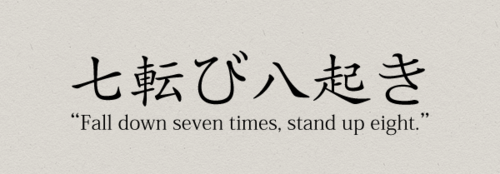Resilience
I like to think of resilience as the ability to ‘fall seven times and stand up eight’ as a Japanese proverb says. In organisations it also means being mindful of each other and ‘seeing beyond what is’. ‘In resilient cultures, members have figured out how to learn and grow in the midst of difficult, sometimes painful environments; they have learned to remain connected to rather than disconnected from one another‘ (Khan, 2005: p. xi).
When choosing resilience, the health of the organisation, of its staff and volunteers, becomes part of the health of the community we aim to support. Learning and care are integrated in the organisational culture.
It’s a fallacy to think that I can alleviate suffering, and contribute to overcoming conflicts ‘out there’, if I choose to ignore the same symptoms in my own work environment. By and large this attitude leads to staff burnout.
Burnout
Burnout is the malaise of our time, it has a psychological, as well as a social, economic and political component (more on this in another post). It’s the ‘rat race syndrome’. The fact that you work for an NGO, the UN, or a social purpose organisation, does not mean that you are immune to the pressures that are generally attached to corporate jobs. Jonathan Lewis from IonPoverty writes about social entrepreneurs:
‘Living long-distance, fast-paced, change-the-world “suitcase careers” is no different than being in the corporate rat race, or any other pressure-cooker job. The causes are cool, the locations exotic, the pay terrible and the lifestyle burned out.’
The same often applies to those who work for humanitarian organisations – though the pay is not always terrible.
Disillusionment and loss of meaning
For many the sudden realisation that the meaningful job they were after, is merely another kind of rat race is rather demoralising. The disillusionment, coupled with work exhaustion, manifests itself as burnout.
Burnout does not happen by chance, or misfortune. It happens due to lack of personal and organisational awareness, care and resilience.
In socially engaged organisations, burnout becomes a chosen path when there is no space for reflection, learning and care. This ‘frenzy’, or ‘doing mode’ – one could call it ‘neurotic activism’ – in the words of Thomas Merton ‘is a pervasive form of contemporary violence to which the idealist fighting for peace by non-violent methods most easily succumbs.’
In most organisations there is plenty of time for ’emergency meetings’, but no time for ‘reflective practice’, which far from being a pampering process, is a process of care and transformation. As any process of transformation, it is bound to be both nurturing and uncomfortable, because it’s about ‘helping ourselves’ as a parallel process of ‘helping others’.
Resilience is organisational mindfulness
Managers, whether in the field or in HQ, play a role in building resilient organisations or in feeding burnout.
Yes, you have that much power! And the good news is that you don’t need a psychologist on site for that.
How will you nurture organisational mindfulness, instead of organisational burnout?
***
Resources:
Anne-Meike Fechter (2012): ‘The Personal and the Professional: Aid workers’ relationships and values in the development process’, Third World Quarterly, 33:8, 1387-1404.
William A. Kahn, (2005) Holding Fast. The Struggle to Create Resilient Caregiving Organizations, Brunner-Routledge: New York.


